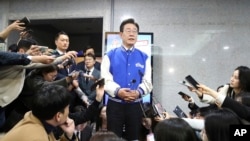South Korea’s left-leaning opposition won a decisive victory in Wednesday’s legislative election, as voters delivered a rebuke to the party of conservative President Yoon Suk Yeol.
The main opposition Democratic Party and smaller allied forces won 189 seats in the 300-seat National Assembly, according to final figures released Thursday by the National Election Commission.
The opposition bloc fell short of a crucial two-thirds majority, however, which would have upended South Korean politics. With 200 seats, the opposition could have overridden Yoon’s legislative veto, proposed constitutional changes, and even impeached the president.
If confirmed, the results will preserve the same basic dynamic that existed before the election — meaning opposition forces can continue to obstruct the domestic agenda of Yoon, who is two years into a single five-year presidential term.
Lee Sang-sin, who focuses on political science and public opinion at the Korea Institute for National Unification, said he expects “three years of deadlock” in Korean politics.
Yoon has faced significant political barriers since first taking office, when opposition forces already controlled the 180 seats needed to block any attempts to delay legislative procedures.
However, South Korea’s powerful presidency has given Yoon a relatively free hand in foreign policy. Yoon has used that power to move his country much closer to the United States, its longtime ally, as well as Japan, South Korea’s former colonial ruler.
Foreign policy was not a main issue in the election, which was instead dominated by allegations of corruption, intraparty divisions and fierce personal attacks.
Yoon’s overseas agenda may not be greatly affected by the election result, according to Benjamin A. Engel, research professor at the Institute of International Affairs at Seoul National University.
“The National Assembly is extremely weak when it comes to foreign policy. They can critique and complain, but Yoon doesn’t have to change unless he wants to for political reasons — which he never seems to do — for better or worse,” Engel said.
With a disappointing election result, Yoon may find more reason to concentrate on foreign affairs, said Mason Richey, associate professor of international politics at Seoul's Hankuk University of Foreign Studies.
“As a lame duck domestically, Yoon will likely focus as much or more than before on foreign policy, since that is where much of his formal power will be,” Richey said.
“The question is how much he will be able to do that, if the jockeying in his own party leads to instability in the presidential office or key ministries,” he added.
Some analysts suggest conservatives may distance themselves from Yoon if they decide he has become a political liability closer to the next presidential election in 2027.
Yoon has seen consistently low approval ratings as he deals with issues such as rising food prices, excessive housing costs, labor disputes and a plummeting birth rate.
Most of the political conversation, however, has centered on a series of personnel and corruption-related scandals, including one involving hidden camera footage appearing to show his wife accepting a luxury Dior bag as a gift.
Following the election loss, several conservative South Korean newspapers published scathing editorials criticizing Yoon. The Chosun Ilbo, South Korea’s largest newspaper by circulation, said the defeat was not due to policy errors or corruption, but because of Yoon’s “arrogance and lack of communication,” saying he tended to “stubbornly go against public sentiment.”
Yoon has taken a tough approach toward his critics. A VOA analysis last year found that he has pursued criminal charges against critical journalists and media outlets at a record pace.
On Thursday, Yoon said via a spokesperson that he “humbly accepts the will of the people” and will strive to reform his administration, stabilize the economy, and enhance people’s livelihoods.
In Wednesday’s election, voter turnout stood at 67%, the highest in more than three decades for a legislative election.
Lee Juhyun contributed to this report.





